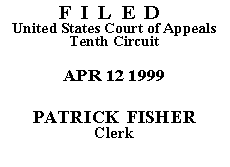

| JOSEPH OSBORNE,
Petitioner-Appellant, v.
BOBBY BOONE, Warden;
ATTORNEY GENERAL OF THE
STATE OF OKLAHOMA,
Respondents-Appellees.
|
|
Petitioner Joseph Osborne, a state prisoner appearing pro se, seeks a certificate of appealability to appeal the district court's dismissal of his 28 U.S.C. § 2254 habeas petition as untimely. As Osborne has failed to make a "substantial showing of the denial of a constitutional right," 28 U.S.C. § 2253(c)(2), we deny a certificate of appealability and dismiss the appeal.
Osborne was convicted of first degree murder and sentenced to life imprisonment without parole. Following his conviction, Osborne's counsel filed a notice of intent to appeal and a designation of record on October 12, 1994, which listed a complete transcript of all proceedings. Further, on that same date, the court granted Osborne's request to be provided a transcript at public expense. On February 3, 1995, a notice of completion of the record on appeal was filed with the clerk. Osborne's conviction and sentence were affirmed by the Oklahoma Court of Criminal Appeals on October 18, 1995, and the time for filing a petition for certiorari expired January 16, 1996. He did not file an application for post-conviction relief. Osborne then filed this § 2254 habeas petition on July 8, 1998.
Under the Antiterrorism and Effective Death Penalty Act (AEDPA), a one-year limitation period applies to the filing of a habeas petition by a person in custody pursuant to a state court judgment. The limitation period runs from the date on which a judgment becomes final by conclusion of direct review or expiration of time for seeking review. 28 U.S.C. § 2244(d)(1). A petitioner whose conviction became final on or before April 24, 1996 (the effective date of the AEDPA), has one year from that date to file a habeas petition. Miller v. Marr, 141 F.3d 976, 977 (10th Cir. 1998).
Courts are required to toll the time "during which a properly filed application for state post-conviction or other collateral review with respect to the pertinent judgment or claim is pending." 28 U.S.C. § 2244(d)(2). Osborne did not file an application for post-conviction relief. He filed a request for documents with the district court on June 18, 1996, and this request was denied on November 20, 1996, after the court concluded he previously had been provided with all of the documents he was requesting. He filed his second request for records and transcripts on April 2, 1997, which was followed by his seeking mandamus relief with the Oklahoma Court of Criminal Appeals when the court did not rule. His mandamus request was denied on February 13, 1998. His attempts to obtain trial records and transcripts at public expense are not collateral proceedings which would result in the tolling of the filing period under § 2244(d)(2). See Hoggro v. Boone, 150 F.3d 1223, 1226-27 (10th Cir. 1998). This is particularly true here where the record indicates he previously has been provided with the documents he now asserts were needed to timely pursue a post-conviction petition.
Osborne asserts the limitation period should be tolled under 28 U.S.C. § 2244(d)(1)(B) because the state impeded his filing by not providing records and transcripts. "The one-year time period begins to run in accordance with individual circumstances that could reasonably affect the availability of the remedy, but requires inmates to diligently pursue claims." Miller, 141 F.3d at 978 (citations omitted). Osborne's assertions are not sufficient to equitably toll the limitation period. His conviction became final on January 16, 1996, and he had until April 24, 1997, to file his habeas petition. Osborne filed his habeas petition on July 8, 1998, which was clearly out of time.
Osborne's request for a certificate of appealability is DENIED and this appeal is DISMISSED. The mandate shall issue forthwith.
Entered for the Court
Mary Beck Briscoe
Circuit Judge
*. This order and judgment is not binding precedent, except under the doctrines of law of the case, res judicata, and collateral estoppel. The court generally disfavors the citation of orders and judgments; nevertheless, an order and judgment may be cited under the terms and conditions of 10th Cir. R. 36.3.